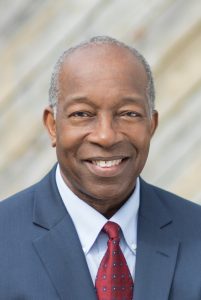Community members, university officials, activists, and clergy will gather in Warrenton, N.C. on September 17 to mark the 40th anniversary of the protests that launched the environmental justice movement. The nonviolent Warren County protests fought against the state’s disposal of soil contaminated with PCBs (polychlorinated biphenyls) in the predominantly Black community.
At the commemoration, throngs of people will walk from Coley Springs Missionary Baptist church to the infamous dumpsite, retracing the steps and singing the songs of the landmark marches. For Reverend Bill Kearney, an associate minister at Coley Springs, an employee at the Center for Heath Promotion and Disease Prevention (HPDP), and a 2011 NC TraCS Research-Engaged Community Scholar (RECS), the event is the culmination of efforts to empower the community to celebrate its place in combating environmental racism.

“It was through the NC TraCS fellowship that I first envisioned what I would like to accomplish as a community researcher,” said Rev. Kearney. “It’s taken many years to see the fulfillment of that vision, which was to build our own legacy around the environmental justice movement and to help move my community from a victim mindset to a victor narrative.”
Kearney developed the Warren County Environmental Action Team (WCEAT) a network of organizations and individuals working together to record, celebrate, and share Warren County’s environmental justice legacy, natural resources, and diverse cultures. He also formed the Warren County African American History Collective (WCAAHC), an effort to collect and create a cohesive history of the area with the goal of making a better future for all local residents.
“It is all about community engagement, documenting stories, elevating people’s voices, and informing policy. I felt like this is what I had been called to do, because the more I dug into the environmental justice movement, the more I saw how it connected with my own family history,” said Kearney, whose great aunt lived at the proposed site of the landfill. Throughout the years, he has felt a personal responsibility to cast his community’s story in the right light.
“We birthed a movement,” said Kearney. “Now we own this movement. We are on the front line when it comes to environmental social justice. And we’re going to demand reparation and to be made whole.”
Moving forward, Kearney hopes to see support for a comprehensive environmental assessment of the health and economic impacts of the PCB contamination. He wants to see data proving whether the residents are safe or not. And he would like to see compensation, so that those held back by environmental racism are better equipped to advocate for their community. “We need some investment in education, our health system, job opportunities, and that doesn’t even address the mental effects of a community that is marginalized and dumped on.”
In August, Rev. Kearney and the WCEAT were awarded the 2022 Environmental Justice Legacy Pioneer Award’ from the NC Black Alliance during their Grounded in Justice Rooted in Wellness Environmental Injustice 22 + Healthcare Summit. They were recognized for their work engaging community leaders on various initiatives, including: offering environmental justice-focused tours of Warren County; supporting local farms and community gardens; connect Warren County with ongoing environmental justice movements; and building community among residents and grassroots organizers in Warren County.
Several other events are slated to discuss the past and the future of the environmental justice movement in NC and beyond:
Aug. – Dec. 22: UNC-Chapel Hill Wilson Library Environmental Justice Exhibit
Sept. 18 from 2 – 4 p.m.: Community Worship Service at Coley Springs Missionary Baptist Church
Sept. 20 from 5 – 8 p.m.: Downtown Warrenton & Warren County Jail Museum EJ Tour
Sept. 24 at 6:30 p.m.: “Back Together Again” Virtual gathering NAACP Warren County Branch
Sept. 30 at 12 – 1 p.m.: “40 Years of Environmental Justice: Birth in Warren County to Today & Beyond” with Rev. Kearney and additional speakers, a free lunchtime webinar hosted by Clean Water for NC
Sept. 30 at 1 p.m.: “The Roots, Experiences, and Future of Climate Justice” with William Barber III, Yumna Kamel, and Dr. Jennifer Hadden at Duke University
Adapted from the UNC School of Medicine North Carolina Translational and Clinical Sciences Institute (NC TraCS) newsroom. Read the original article.
